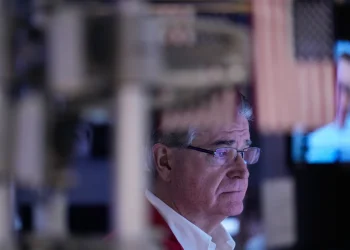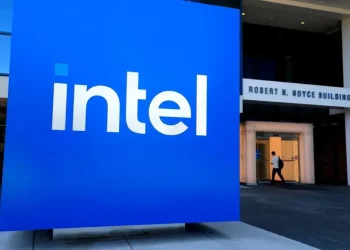OpenAI and AMD Announce Strategic Partnership to Build Next-Generation AI Infrastructure
October 6, 2025, 22:15 EDT
OpenAI Strikes Major Deal with AMD to Boost AI Computing Power
OpenAI and semiconductor manufacturer AMD have signed a landmark agreement to strengthen global artificial intelligence (AI) infrastructure, marking a significant expansion in the rapidly evolving AI hardware sector.
The deal, announced Monday, includes a supply agreement for AMD’s forthcoming Instinct MI450 high-performance chips and gives OpenAI the option to acquire up to a 10% stake in AMD. The partnership underscores OpenAI’s efforts to diversify its chip suppliers and accelerate the development of next-generation AI systems.
Details of the Partnership
Under the agreement, AMD will supply up to 6 gigawatts of computing capacity to support OpenAI’s next wave of AI models and infrastructure projects. The first deployment—representing 1 gigawatt of computing power—is expected to go live in the second half of 2026, according to a joint company statement.
OpenAI will also gain a warrant to purchase up to 160 million shares of AMD common stock, equivalent to roughly 10% of AMD’s outstanding shares. The warrant will vest in stages, tied to computing capacity milestones and certain undisclosed share-price targets.
AMD’s stock surged 25% in pre-market trading following the announcement, while shares of rival Nvidia dipped slightly after a record-breaking year for its stock price.
Boost for AMD Amid Fierce AI Hardware Competition
The deal represents a significant opportunity for AMD, which has lagged behind Nvidia in supplying high-end graphics processing units (GPUs) to AI developers. Nvidia’s chips currently dominate the AI compute market, powering most of the data centers used by companies like OpenAI, Microsoft, and Google.
“This partnership is a major step in building the compute capacity needed to realize AI’s full potential,” OpenAI CEO Sam Altman said in a statement. “AMD’s leadership in high-performance chips will enable us to accelerate progress and bring the benefits of advanced AI to everyone faster.”
The collaboration positions AMD as a credible alternative supplier for large-scale AI workloads, potentially easing global shortages in AI chips.
Part of a Larger AI Expansion Strategy
The OpenAI-AMD agreement follows a $100 billion partnership announced last month between OpenAI and Nvidia. That deal aims to deliver at least 10 gigawatts of additional data center computing power, anchored by the new Stargate data center campus under construction in Abilene, Texas.
At the facility, OpenAI and its partners have already installed hundreds of Nvidia’s GB200 supercomputing racks, each containing dozens of advanced AI processors. The addition of AMD’s technology is expected to further diversify OpenAI’s computing ecosystem and mitigate reliance on a single supplier.
Industry analysts say the deal illustrates the sheer scale of computing power required to meet global AI demand. “We realize there will be delays with these deals, and that the infrastructure required largely doesn’t exist today,” Barclays analysts noted in a research briefing. “But this is a clear proof point that the ecosystem is desperate for more compute.”
Broader Implications for the AI Ecosystem
The AMD partnership not only strengthens OpenAI’s technical backbone but also highlights a broader industry trend toward supplier diversification and capacity expansion.
Analysts suggest that while the agreement may not immediately impact Nvidia’s market share, it signals growing pressure on the semiconductor supply chain to keep pace with the AI boom. Global demand for data center chips has surged as companies race to train and deploy increasingly complex language and vision models.
With governments and enterprises investing heavily in AI infrastructure, partnerships like OpenAI’s with AMD may shape the next decade of computing innovation.
Market and Industry Outlook
AMD’s push into AI hardware mirrors the company’s strategy to expand beyond gaming and traditional computing markets. The Instinct MI450 chip series, expected to debut next year, is designed to compete directly with Nvidia’s H100 and H200 processors, offering improved performance for large-scale AI workloads.
If successful, the collaboration could boost AMD’s position in a market projected by Bloomberg Intelligence to exceed $400 billion by 2030. Meanwhile, OpenAI’s diversified sourcing strategy may enhance operational resilience and accelerate its roadmap for AI model deployment.
As AI adoption continues to surge across industries, this partnership underscores the sector’s momentum—and the strategic importance of securing reliable, scalable computing power.
This article was rewritten by JournosNews.com based on verified reporting from trusted sources. The content has been independently reviewed, fact-checked, and edited for accuracy, neutrality, tone, and global readability in accordance with Google News and AdSense standards.
All opinions, quotes, or statements from contributors, experts, or sourced organizations do not necessarily reflect the views of JournosNews.com. JournosNews.com maintains full editorial independence from any external funders, sponsors, or organizations.
Stay informed with JournosNews.com — your trusted source for verified global reporting and in-depth analysis. Follow us on Google News, BlueSky, and X for real-time updates.














